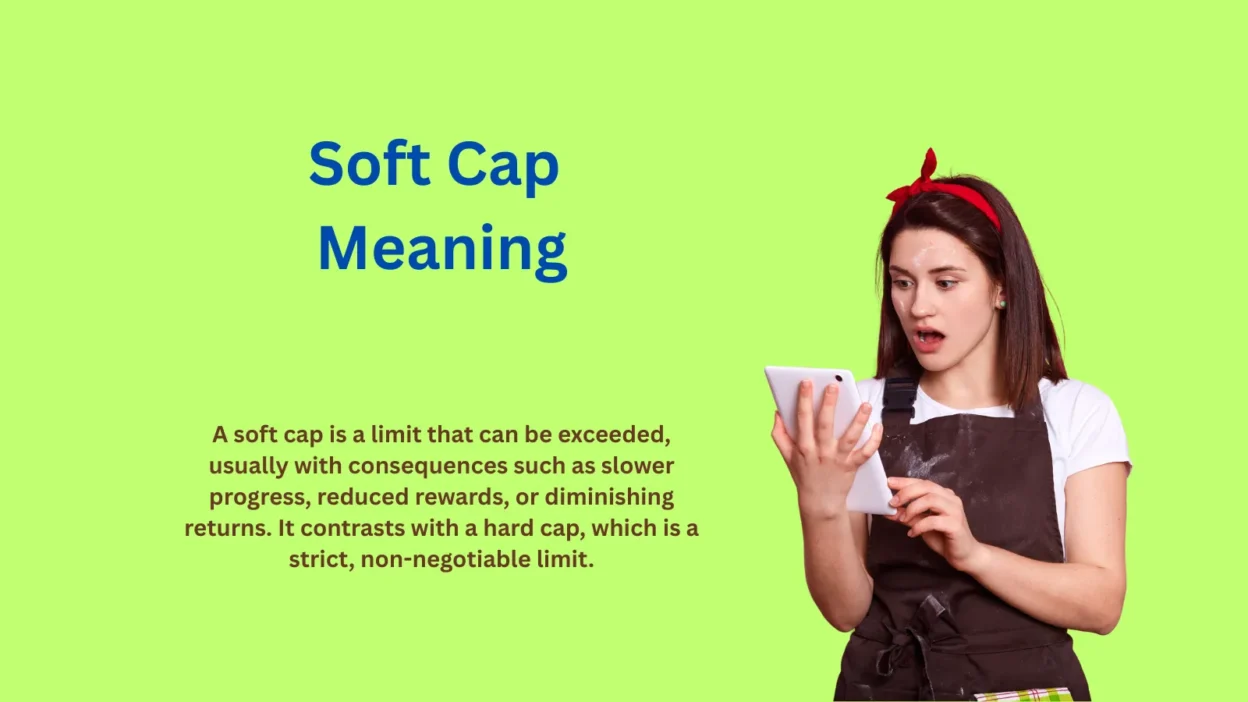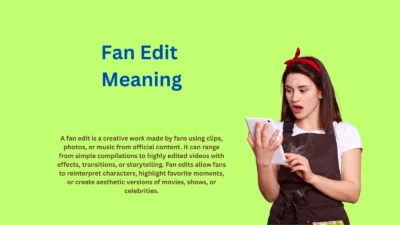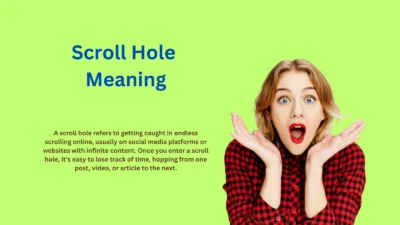From video games to finance discussions, Soft Cap Meaning is a term you’ll encounter often. A soft cap refers to a limit or threshold that is flexible or adjustable, unlike a hard cap, which is strict and absolute. It’s used to describe situations where growth, rewards, or investments can continue past a certain point, but with diminishing benefits or reduced efficiency.
People often use the term in everyday contexts like:
- “The game has a soft cap on experience points, so you’ll gain less XP after reaching level 50.”
- “Our fundraising has a soft cap, but donations above that still count.”
In this article, we’ll explain what a soft cap is, explore its origin, show how it’s used in gaming, finance, and other contexts, and provide examples to highlight its importance.
What Does “Soft Cap” Mean?
A soft cap is a limit that can be exceeded, usually with consequences such as slower progress, reduced rewards, or diminishing returns. It contrasts with a hard cap, which is a strict, non-negotiable limit.
Example Sentences:
- “The game implements a soft cap at level 60, where XP gains slow down but don’t stop entirely.”
- “The company set a soft cap for annual bonuses to manage costs without discouraging employees.”
Key Points to Remember:
- Soft cap = flexible limit with diminishing benefits.
- Common in gaming, finance, rewards systems, and investments.
- Encourages continued participation while preventing excessive gains.
- Differs from a hard cap, which is absolute and cannot be exceeded.
Background & History
The term soft cap originates from gaming and finance, where limits are often implemented to balance systems or manage resources.
- In gaming, soft caps control progression: after reaching a certain level, the growth rate slows but players can continue leveling.
- In finance, soft caps manage investments or fundraising by setting suggested thresholds without strict cutoffs.
Over time, the concept spread to other industries, such as employee bonuses, reward programs, and even social media algorithms, emphasizing flexible limits with gradual effects rather than abrupt stops.
Usage in Various Contexts
In Gaming
Soft caps are widely used in RPGs, MMOs, and mobile games to balance progression:
- “After level 80, stats increase at a slower pace due to the soft cap.”
- “Soft caps prevent players from maxing out abilities too quickly while still rewarding effort.”
In Finance & Investments
Soft caps appear in fundraising, investment platforms, and token sales:
- “The ICO has a soft cap of $1 million, but contributions above that are accepted.”
- “Soft cap thresholds encourage investors without restricting participation completely.”
In Professional or Rewards Programs
- “Employees can earn bonuses beyond the soft cap, but additional amounts are smaller.”
- “The loyalty program has a soft cap on points, so extra purchases give smaller rewards.”
Common Misconceptions & Clarifications
- “Soft cap means unlimited.”
Not true — there’s still a limit; the difference is flexibility and reduced effectiveness beyond the threshold. - “Soft cap is only used in gaming.”
Incorrect — finance, marketing, investments, and rewards systems also use soft caps. - “Soft cap is bad for progress.”
No — it maintains balance while still allowing continued growth or contribution.
Example Dialogue:
- Alex: “Why bother after the soft cap?”
- Jamie: “You can still grow or earn — just at a slower pace. It keeps things fair.”
Soft caps are about balance, fairness, and sustainable growth, not strict limits or restrictions.
Similar Terms & Alternatives
| Term | Meaning | Example |
|---|---|---|
| Hard Cap | Absolute limit | “The ICO has a hard cap of $5 million.” |
| Diminishing Returns | Reduced benefits after a threshold | “XP gain slows due to diminishing returns.” |
| Threshold | Point at which effects begin | “The soft cap threshold is level 50.” |
| Limit | Maximum allowed value | “The spending limit is $1,000.” |
| Ceiling | Upper boundary | “Soft cap acts as a ceiling for early rewards.” |
These terms are related, but soft cap specifically implies flexibility with reduced effectiveness beyond a point.
How to Respond to This Term
When someone mentions a soft cap, your response depends on context:
Casual / Gaming:
- “Ah, so you can still level up past that?”
- “Soft cap makes sense — keeps the game balanced.”
Finance / Professional:
- “Understood, we can still accept contributions beyond the soft cap.”
- “Soft cap ensures sustainability without cutting off growth.”
Funny / Informal:
- “Soft cap? More like soft nap time for my XP!”
- “Soft cap or soft ‘why am I still grinding?’”
The best response acknowledges the flexibility and gradual effect of the soft cap.
Regional or Industry Differences
Soft caps are recognized globally but differ by context:
- Gaming (US, Europe, Japan): Balances leveling, rewards, and stats.
- Finance (Global): Fundraising or token sales often include soft caps to attract more investors.
- Rewards Programs: Loyalty points or bonuses often have soft caps to prevent abuse while still incentivizing users.
Across contexts, soft caps emphasize flexible limits and sustainable growth.
Comparison with Similar Terms
| Expression | Focus | Soft Cap Difference |
|---|---|---|
| Hard Cap | Absolute limit | Soft cap is flexible, not absolute |
| Threshold | Starting point for effect | Soft cap indicates slowed progress above it |
| Diminishing Returns | Gradual reduction in benefit | Soft cap implements diminishing returns explicitly |
| Ceiling | Upper boundary | Soft cap is adjustable, not fixed |
Soft caps balance progression while other terms focus on strict boundaries or points of effect.
Usage in Online Communities & Apps
Reddit, gaming forums, and investment discussions:
- Soft cap is frequently mentioned in strategy guides, fundraisers, and token sale posts.
- Example hashtags or mentions: #SoftCap, #GameLimits, #InvestmentThreshold
In Apps or Platforms:
- Users may mention soft caps in rewards systems or subscription perks, highlighting gradual benefits.
- Example: “The loyalty program has a soft cap, but extra points are still earned.”
Hidden or Offensive Meanings
Soft cap has no offensive or hidden meanings. It’s a neutral term in all contexts.
- However, sarcasm or frustration can appear in informal gaming:
- “Ugh, hit the soft cap again!”
- Tone and context clarify intent.
Suitability for Professional Communication
Soft cap is acceptable in professional, finance, or gaming discussions.
For formal business documents:
- “Flexible threshold” or “Suggested limit” can replace soft cap.
- Example: “The soft cap (suggested limit) for fundraising is $1 million.”
This keeps communication clear, professional, and accurate.
FAQs
- What does soft cap mean?
A soft cap is a flexible limit with reduced effectiveness beyond a certain point. - How is it different from a hard cap?
A hard cap is absolute; a soft cap allows exceeding the limit but with diminishing benefits. - Where is soft cap used?
Gaming, finance, investments, rewards programs, and professional projects. - Does hitting a soft cap stop progress?
No — it slows progress, reduces rewards, or limits efficiency, but doesn’t stop it completely. - Can soft caps be changed?
Yes — by game developers, finance managers, or program administrators. - Is soft cap a technical term?
Informal but widely understood across gaming, finance, and professional contexts.
Conclusion
Soft cap meaning goes beyond a simple limit — it’s about flexibility, balance, and sustainable growth. Whether in video games, fundraising, or reward programs, soft caps allow continued progress while preventing excessive or unfair gains.
Next time you see a soft cap in a game, app, or investment platform, remember: it doesn’t stop you — it guides growth thoughtfully. Soft caps are a smart way to encourage effort while keeping systems balanced and fair.





